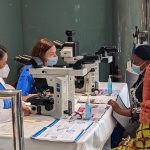Foundation Expands Impact Globally
For over a decade the CAP Foundation has worked to improve health equity across the United States through its See, Test & Treat® program by providing essential screening and health services to medically underserved communities. And for many years, the Foundation has directly supported early-career pathologists and medical students with leadership and educational opportunities to help develop the future leaders of the specialty.
While the CAP Foundation continues to broaden the reach of these programs, the organization and its supporters have set their sights on expanding beyond the US horizon.
Beginning in 2020 with the establishment of the Global Pathology Fund from supporter and Board of Directors member Gerald R. Hanson, MD, FCAP, the Foundation has been moving forward with programs and plans to provide pathology-focused assistance in under-resourced countries around the world.
“We live in a global community and as pathologists we understand the importance of an accurate and prompt diagnosis in the care and well-being of each person in need of our services whether they reside in our city, state, country, or around the globe,” explains Gail H. Vance, MD, FCAP, chair of the CAP Foundation Global Pathology Committee. “The CAP Foundation saw an opportunity to expand global pathology capacity and achieve equity in global health and we took it.”
Thanks to the continuing commitment of the CAP Foundation Global Pathology Committee, the initiative has made significant strides by founding and then expanding both the Global Pathology Development Grant (previously titled the Global Pathology Award) and the Global Pathology Education Award.
Dr. Vance said these awards and the initiatives they fund were planned to address different areas while reaching the same goal. “For our Global Pathology initiatives, each program works to strengthen the next one providing synergy and sustainability of our efforts,” she said.
The Global Pathology Development Grant, now in its second year, provides funding to support impactful, sustainable projects that develop and expand the delivery of pathology services in medically under-resourced countries. This may be achieved through education and training or projects and initiatives that impact patient care, laboratory quality, or enhanced technology and laboratory diagnostics.
In 2022, the CAP Foundation received two dozen applications for Global Pathology Development Grants representing pathology and laboratory medicine initiatives in 14 countries.
“Even though we’ve been working with a relatively small budget, we’ve had a lot of great applicants and still been able to make a big impact,” said Julia Rankenburg, senior manager of programs and fund administration with the CAP Foundation.
Three awards were given to improve care and pathology services in Ghana, Ethiopia, and Vietnam with projects over a wide area of pathology and laboratory medicine, but all directly improving patient care.
The University of Health and Allied Sciences is using the funds to develop a program to characterize isolates of the Candida species to tackle antimicrobial resistance in Ghana. The Open Pathology Education Network is developing a platform for the delivery of pathology education in Vietnam, initially targeting bladder cancer and gynecological pathology. Lastly, the Beckman Research Institute City of Hope is developing a teaching manual for immunohistochemistry to determine receptor status of breast cancer tissue in Ethiopia.
The Global Pathology Education Award, now in its fourth year, supports pathologists outside the US with virtual attendance at CAP annual meetings to attend educational sessions and offers the opportunity to apply for one year of complimentary International Fellow CAP membership.
The award has grown significantly since its inception in 2020. As part of a pilot of the new award in 2020, three awards were given to practicing pathologists in three different countries. Word spread in 2021 and 27 applicants from 10 countries applied for the award—the Foundation was able to fund 10 awards. The enthusiastic response continued in 2022, resulting in 35 applications received from 10 countries—15 awards were bestowed.
In feedback to the CAP Foundation, all awardees who attended the annual meeting stated they will make changes to testing and personnel management based on what they learned through virtual education sessions. That sentiment is backed by direct testimonials from awardees.
“Coming from a developing country in South Asia, I do not get exposure to new technology or best lab practices,” said Daisy Maharjan, MD, who practices in Nepal. “This meeting will aid in my mission to improve the quality of laboratory services in this hospital and continue to make an impact on patients’ lives.”
“The Global Pathology Education Award has been a lifetime opportunity for me. It has helped in expanding my horizon of knowledge and practice to newer approaches and concepts in this ever-advancing field of pathology,” said 2021 recipient Manisha Shrestha, MD.
The committee is currently developing new programs and awards, as well as helpful resources for pathologists everywhere. This includes education around the CAP cancer reporting protocols in the form of webinars, which was pursued after the committee learned that practicing pathologists in low-resource countries have access to the cancer reporting protocols but may not know fully how to use them.
This further solidified the idea to offer webinars that will provide more basic education on implementing protocols as well as Q&A sessions to learn more about what barriers international laboratories may be facing. Webinars and other resources specifically tailored to international pathologists will help implement a higher level of quality in pathology laboratories everywhere.
Learn more about how you can support the CAP Foundation’s efforts to expand health equity and improve laboratory medicine outside the US.


